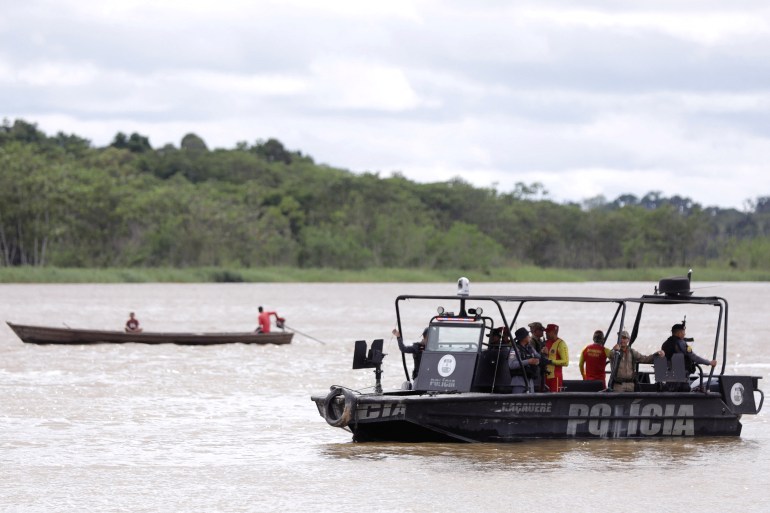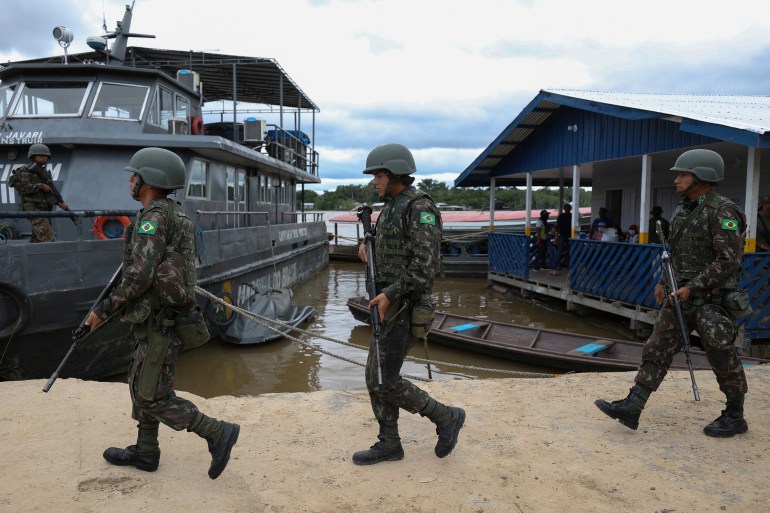Disappearance of pair in Brazil’s Amazon may involve ‘fish mafia’
A main line of police investigation into the disappearance of a British journalist and an Indigenous official in the Amazon points to an international network that pays poor fishermen to fish illegally in Brazil’s second-largest Indigenous territory, authorities said.
Freelance journalist Dom Phillips and Indigenous official Bruno Pereira were last seen on the morning of June 5 near the Javari Valley Indigenous Territory, which sits in an area the size of Portugal bordering Peru and Colombia.
The two men were in the Sao Rafael community and were returning by boat to the nearby city of Atalaia do Norte, but never arrived. Police said on Saturday that they were still analysing human matter found in the area where the pair disappeared.
Police are also investigating a scheme run by local businessmen, who pay fishermen to enter the Javari Valley, catch fish, and deliver it to them.
One of the most valuable targets is the world’s largest freshwater fish with scales, the arapaima. It weighs up to 200kg and can reach 3m in length. The fish is sold in nearby cities, including Leticia in Colombia, Tabatinga in Brazil, and Iquitos in Peru.

An illegal fishing trip to the vast Javari Valley lasts around one month, according to Manoel Felipe, a local historian and teacher who also served as a councilman. For each illegal incursion, one fisherman earns at least $3,000.
“The fishermen’s financiers are Colombians,” Felipe said.
“In Leticia, everybody was angry with Bruno [Pereira]. This is not a little game. It’s possible they sent a gunman to kill him.”
‘Personal feud’
The only known suspect in the disappearances is fisherman Amarildo da Costa de Oliveira, also known as Pelado, who is under arrest.
He denies any wrongdoing and said military police tortured him to try to get a confession, his family told the Associated Press.
According to accounts by Indigenous people who were with Pereira and Phillips, the fisherman had brandished a rifle at the pair the day before they disappeared.
Pereira, who previously led the local bureau of the government’s Indigenous agency, known as FUNAI (Fundacao Nacional do Indio), had taken part in several operations against illegal fishing.
In such operations, as a rule the fishing gear is seized or destroyed, while the fishermen are fined and briefly detained, as only the Indigenous can legally fish in their territories.
FUNAI official Maxciel Pereira dos Santos was gunned down in 2019 in front of his wife and daughter-in-law. Three years later, the crime remains unsolved. His FUNAI colleagues told AP that they believe the crime is linked to his work against fishermen and poachers.
“The crime’s motive is some personal feud over fishing inspection,” the mayor of Atalaia do Norte, Denis Paiva, speculated to reporters about the disappearances without providing more details.
While some police, the mayor and others in the region link the pair’s disappearances to a “fish mafia”, federal police have not ruled out other lines of investigation. The area has heavy narco-trafficking activity.

Fisherman Laurimar Alves Lopes, 45, who lives on the banks of Itaquai River, where the pair disappeared, told the AP he gave up illegally fishing inside the Indigenous territory after being detained three times. He said he was taken to local federal police headquarters in Tabatinga, where he was beaten and left without food.
“I made many mistakes, I stole a lot of fish … But then I said: I’m going to put an end to this, I’m going to plant,” he said during an interview on his boat.
Al Jazeera’s Monica Yanakiew, reporting from a vigil held for the two disappeared men in Rio De Janeiro, said Phillips’s mother-in-law, who was at the event, said she was “not hopeful that they will be found alive” though the search was ongoing with “all hands on deck”, including journalists who have joined the effort to find the missing men.




